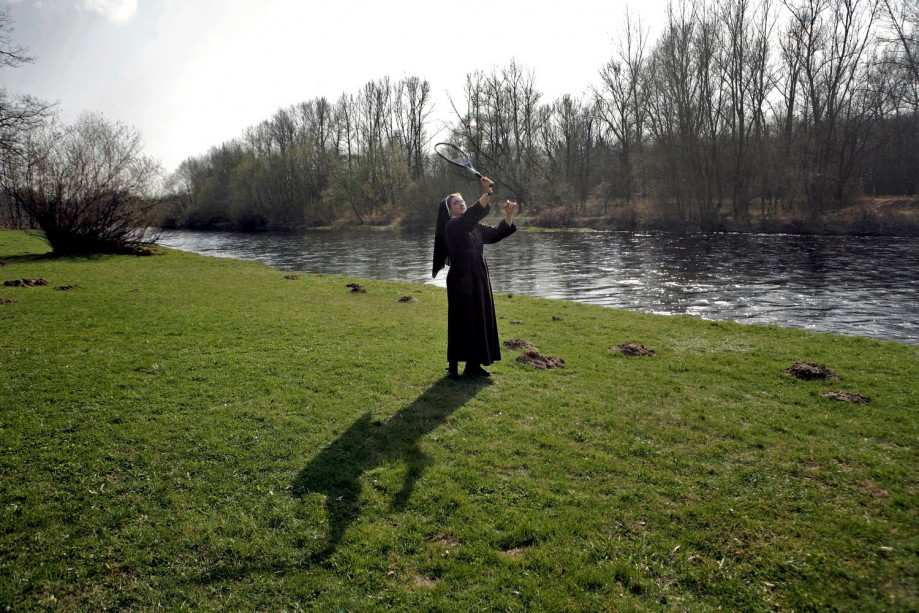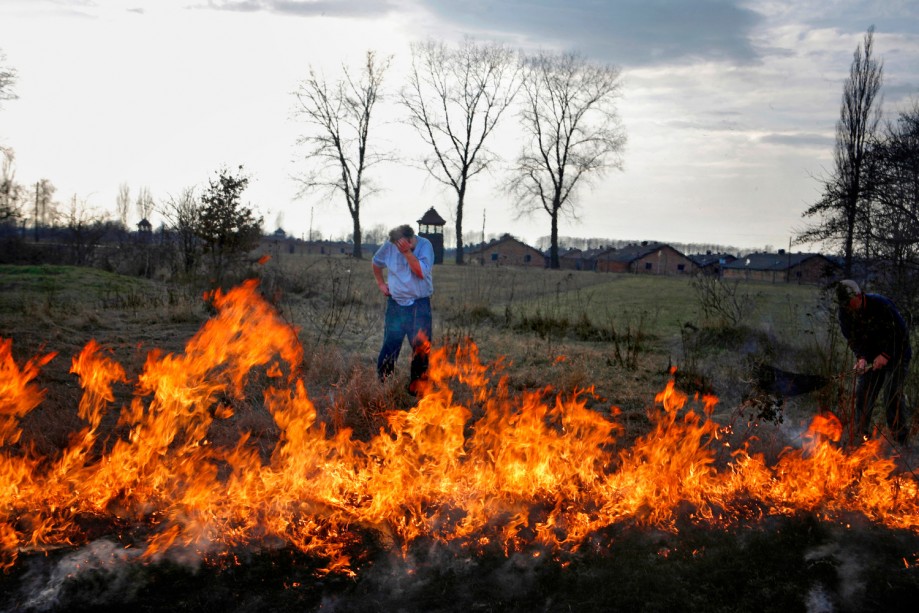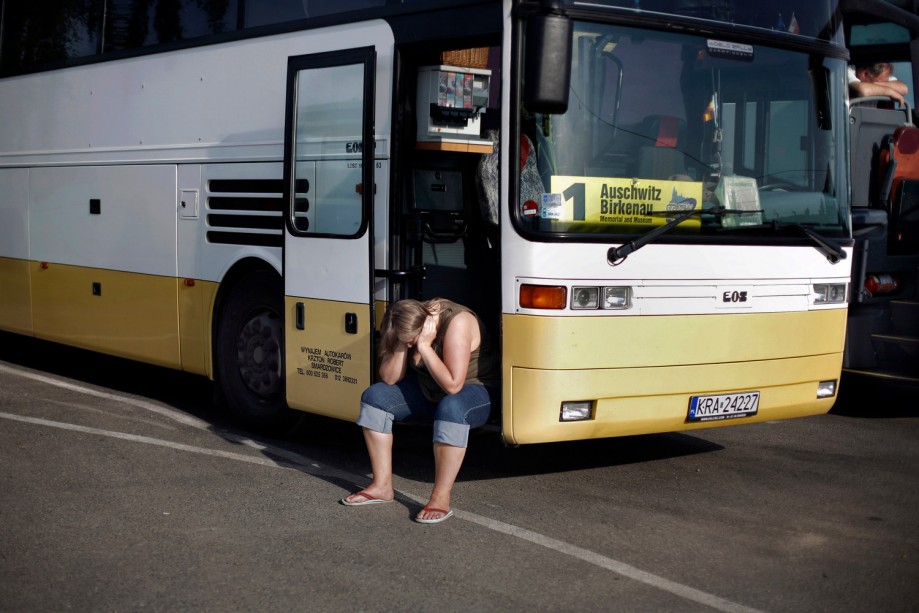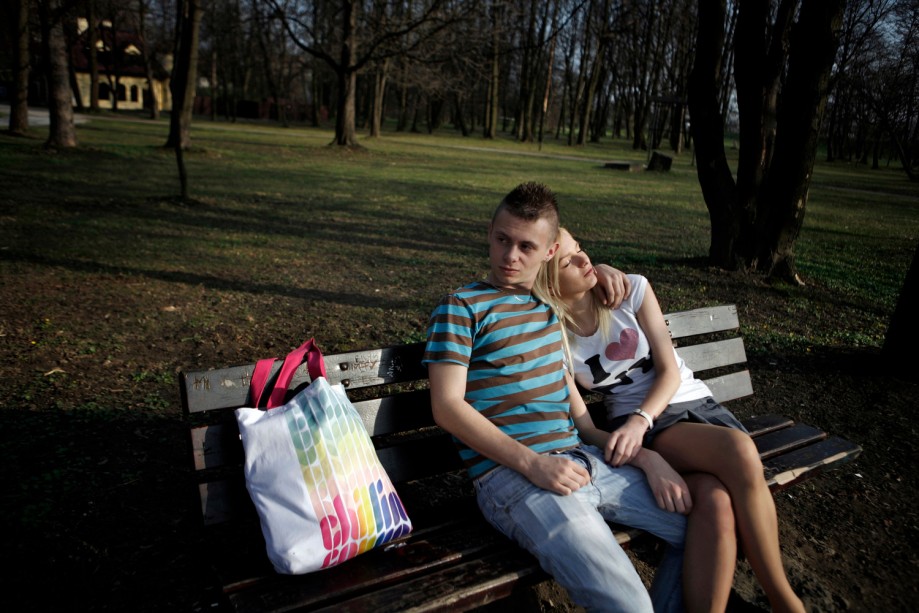Notes
Danny Ghitis in Poland: Ordinary Life in Auschwitz
Danny’s caption: A nun plays badminton with school children on the banks of the Sola river in Oswiecim, Poland. About a mile down the river lies the concentration camp of Auschwitz. Our reflection: Maybe the absurdity of this photo — the incongruous mix of Christianity (and the nun “letting herself go”); the deep sense of quiet; the sense of nature … in all its precision; the seemingly partner-less badminton, all coupled with knowledge of the death camp downstream is what produces in me an equally odd (and likely defensive) association. What immediately popped into my head when I saw this photo was: “The Sound of Music.”
Danny’s caption: A controlled burn of a crop field in the Polish town of Brzezinka, in view of the extermination camp Auschwitz II – Birkenau. Our reflection: It’s a fabulous picture the way the metaphor operates. The analogy to the crematorium-in-action is so intense, I immediately look past the fire to the man’s face and expression, which I want to believe exhibits a deep sense of shame. At the same time, of course, I know that’s complete illusion. It’s just a local farmer who — in a completely different way than I did — got a little too close to the heat. On top of that, the sense of approaching dusk, the tower and its alignment with the man, and the barely discernible guy far right shoveling earth freaks me out.
Danny’s caption: A tourist at Auschwitz II – Birkenau sits at a tour bus in the parking lot by the “death gate.” Our reflection: Perhaps this photo is a little too easy, on the one hand, playing the unfathomable reality of Auschwitz against the suggestion of “a bad day.” What makes the picture, however, is the bland icon of the tourist bus ferrying today’s millions to the concentration camp, these hallowed names whittled down to tour signage color-coordinated with the coach’s blasphemously non-horrific yellow.
Danny’s caption: A young couple waits for the sunset by the river boardwalk in Oswiecim. Our reflection: Perhaps the banality of this photo makes it the most striking of the group, given the trappings of consumerism, especially the “I heart” tourism logo. It smacks of freedom as a cheap, modern-day reflex. But then, where the photo slams us with an association to the death camps — the young man looking distracted in the face of love, these two whiling away time — is in the point that: youth have futures.
***********
In a departure from our usual focus on contemporary news imagery, BagNews is excited to launch this series from photographer Danny Ghitis, who has been traveling to Poland and exploring the subtle and nuanced nature of memory, history, and ordinary life in Auschwitz:
A few weeks ago, the New York Times published an article about upcoming changes to exhibitions at the Auschwitz-Birkenau State Museum in Poland. Museum director Piotr Cywinski said the new approach will go beyond “facts and information” and focus on “responsibility to the present,” to educate a generation that is removed from the reality that led to the Holocaust.
Without context, the article’s dateline, “OSWIECIM, Poland,” is unrecognizable to most people. The name of this small Polish city of about 45,000 people, when translated to German, represents the quintessential symbol for genocide. Yet, despite that tourist numbers have skyrocketed – last year they reached 1.38 million- most visitors are oblivious to the town they pass through.
In early 2010 I ventured into this town to challenge my own assumptions about what it’s like to live in the shadow of the world’s most notorious prison and cemetery. As the grandson of a Holocaust survivor I’ve grown up hearing horror stories, mourning the victims, and reciting the mantra “never again.” But what does that mean today? It can’t just be about demonizing one group while enshrining the other. The reality of Auschwitz as it exists today is extremely complex in the way it affects the world. To examine its closest neighbors is to take a hard look in the mirror and reflect on the scars of our past.
Marek Zajac, the secretary for the International Auschwitz Council, makes an interesting point: “When I am at Auschwitz I start looking at the world and at my own life. I remind myself of what’s important, which is so easy to forget. In the kingdom of death you can find the meaning of life. At the biggest cemetery in the world I know what I live for.”
–Danny Ghitis
(BagNews commentary by Michael Shaw)
PHOTOGRAPHS by DANNY GHITIS.






Reactions
Comments Powered by Disqus